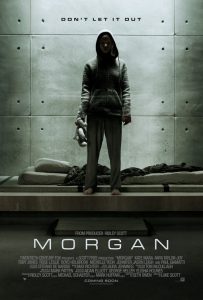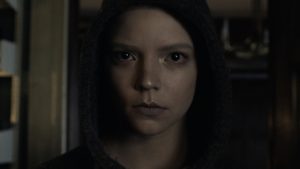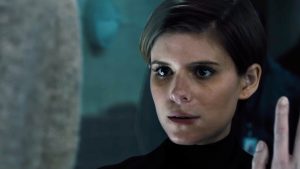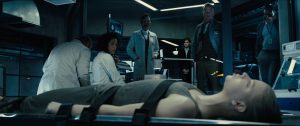
The marriage between horror & sci-fi in “Morgan” is an uncomfortable one. The first half of the film is of a high-minded sci-fi bent, with the morals & ethics of human cloning being brought into play. The second half is of a standard slasher, with jump scares and a body count acting as its anchor. The two halves never quite mesh together, with a predictable twist meant to bring everything full circle coming across as hokey. Said twist seems slightly ingenious at first, but quickly thinking about its implications and ramifications tarnishes it. It also goes a long way in undoing a lot of the psychology and commentary presented in the first half.
That’s not to say the first half is without its faults. Its commentary on the ethics and morals of human cloning is hamfisted at best. Corporate risk-management consultant Lee Weathers (Kate Mara) is brought in to investigate and report on the progress of case designate Morgan (Anya Taylor-Joy). An incident has recently occurred in which the clone lost her temper, stabbing one of the scientists, Dr. Kathy Grieff (Jennifer Jason Leigh), in the eye. The rest of the crew, including the victim, believe it to be a mistake on Morgan’s part, one that she’s remorseful about. Lee isn’t having any of this.

The first act is made up of Lee questioning the scientists on Morgan’s status and interrogating Morgan herself (or itself, as Lee refers to the clone as). One scientist, Dr. Simon Ziegler (Toby Jones), argues vehemently with Lee in favor of allowing Morgan to live. He constantly reminds her (and the audience) that Morgan, whilst embodying the appearance of a teenager and the intelligence of a well-taught one, is only five years old. This means she’ll have outbursts akin to a temper tantrum, albeit incredibly violent ones. Again, Lee is having none of this.
Where one begins to question the morality is in how Lee handles herself. She talks down Morgan, referring to her as it and denouncing any notion that the specimen can exhibit emotions. All the while, Kate presents herself as impassive, speaking in a monotone voice and dismissing the bond the scientists have with their creation. She never seems to comprehend how the scientists view Morgan as their child, or does and simply doesn’t care. While we see her viewpoint, we analyze how unhuman she is acting and compare it to the rather emotional and more humane Morgan.

Then comes the turning point for the film. Dr. Alan Shapiro (Paul Giamatti) is brought in to perform a therapy session with Morgan. He is warned to conduct the session from behind bulletproof glass, but neglects to do so, wanting to gain Morgan’s trust. This scene is the only one in the film that sufficiently develops effective tension, as the longer he pries at Morgan, the more the hairs on the back of my neck began to stand up as I questioned when Morgan would snap. Bringing in the phenomenally talented Giamitti, who knows how to balance chewing scenery and invoking drama, went a long way in making this scenario work!
After Morgan pounces on Shapiro, Lee and the scientists agree that she needs to be terminated. Well, most of them do. A few protest, lashing back at Lee by locking her in Morgan’s containment area and fleeing with Morgan to safety. It was at this point I had hope in the film, believing director Luke Scott was going to take the film in a brave and smart direction. One that would act more as a psychological thriller, with the morals of the scientists and corporate colliding as Lee tries to track down Morgan and protect civilization from harm. Alas, this was not the direction Luke Scott went with unfortunately.

Instead, Morgan rebels against her creators who tried to put her down, killing the majority of them in quick fashion. She takes one of them, Dr. Amy Menser (Rose Leslie), hostage, while Lee easily escapes the containment area and teams up with the group’s cook and designated love interest, Skip Vronsky (Boyd Holbrook), to terminate Morgan. What follows is a preposterous trek through the woods, where Lee and Morgan engage in tacky fights ripped from a low-rent action flick. I had major qualms with these fights, but to reveal them would be to spoil the twist. Despite not liking the film or the twist, I’ll be professional and resist spoiling it for those still curious to check this film out. All I’ll say is, while it eradicated my issues with the final act, it presented more issues with the first half that I didn’t initially have. It’s the equivalent of a janitor cleaning up a mess, only to take a giant dump on his efforts immediately after. Crass, I know, but it proves my point.
Luke Scott is the son of director Ridley Scott, most famous for his classic film, “Alien.” That was a film that successfully combined the elements of horror & sci-fi to create a chilling and fascinating story! What made that film work was its simplicity. It was a survival horror film first, replete with engaging and likable characters and suspense from an alien stalking them. The sci-fi was only explored as much as it needed to be, that being minimally in order to complement the horror. It was claustrophobic and intense! Scott tries his best to ape this, but gets in too over his head. I commend him for bringing morality and psychology into play, but they’re undone by rushed pacing and expository dialogue. He misses opportunities to incite claustrophobia, such as allowing Lee an easy escape from the containment area, and resorts to cheap slasher tricks for the finale. I don’t know how much of Seth W. Owen’s script is to blame, but Scott should’ve overridden those issues if that were the case.
Final Rating: C
